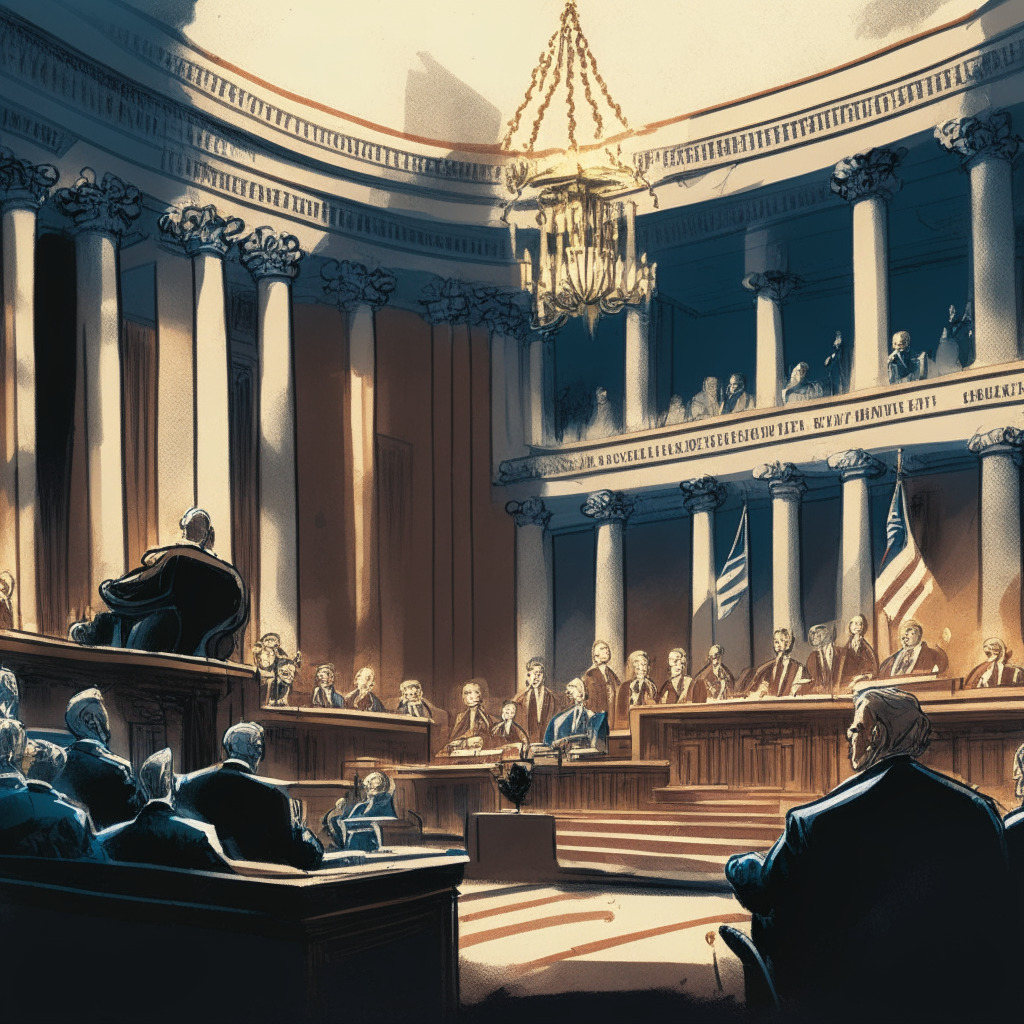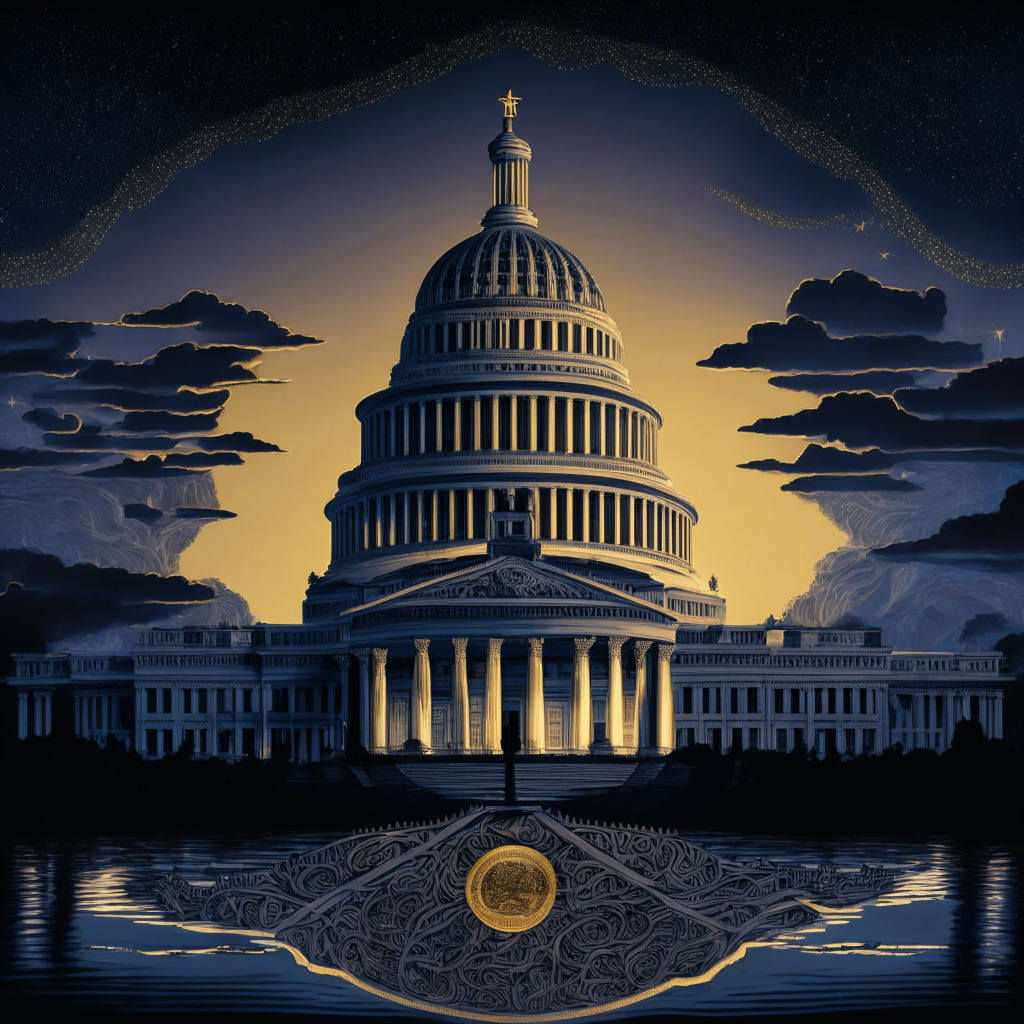Cryptocurrencies recently experienced a shocking mid-afternoon dip, with altcoins like Ripple, Dogecoin, Polkadot, Polygon, and Uniswap losing over 4%. This downturn may be linked to strong U.S. retail sales data, which sparked fears of increased central bank tightening.
Search Results for: us treasury
Impending Bitcoin Boom? Examining Market Signals and Global Economic Factors
“A decline in Bitcoin’s short-term holders and record-low volatility could suggest an impending bull market. A recent report indicates this narrow trading range has happened only twice in Bitcoin’s history, prompting speculation about significant market movement. However, these indicators don’t guarantee outcomes with shifting global economic conditions.”
A Showdown at G20: Is Global Crypto Regulation the Answer or Another Problem?
“G20 leaders have emphasized the need for global coordination on crypto regulations. The IMF managing director likens crypto to water, stating that it always finds its way out. Amidst heated discussions, India pushes for a globally coordinated approach, despite internal resistance and the country’s unique crypto issues.”
U.S. Government Debt Downgrade: A Storm Ahead for Bitcoin or A Silver Lining?
The U.S. Government’s debt downgrade by Fitch Ratings may impact the digital investment market, including Bitcoin. Investors are being driven from traditional assets into safer short-term instruments. Amidst this uncertainty, the potential lies for investors to shift towards decentralized avenues like cryptocurrencies.
Navigating Crypto’s Role in Political Fundraising: A New Dawn or Regulatory Nightmare?
The California Fair Political Practices Commission issued new rules for political aspirants accepting crypto donations, outlining specific procedures to ensure transparency and accountability. Crypto donations are becoming common in campaigns, though with stipulations around anonymous donors and exchange agreements. Regulations also cover advertising disclosures, contribution limits, and more.
Aragon Association’s Decentralization Dilemma: Facing Pressure from Activist Investors
The Aragon Association, a Swiss-based, decentralized governance-focused cryptocurrency project, wrestles with pressure from activist investors keen on its $180 million treasury. Amidst allegations of legal violations and inefficient management, Aragon contemplates selling the project to an undisclosed buyer. A complex power and influence struggle brews within Aragon’s governance structure.
Navigating the Waters of a Digital Pound: The UK’s Leap into CBDC’s Future
“The Bank of England is advancing in the world of cryptocurrencies, establishing a new Central Bank Digital Currency (CBDC) Academic Advisory Group. Tasked with facilitating interdisciplinary discussions on a potential digital pound, this group is aimed at managing a multifaceted assembly of expertise, spanning from monetary policy to law, marketing and more. Their success could pave the way for a sustainable and successful digital pound in the future.”
Surging Bitcoin Tests $30,000 Threshold: The Excitement and Concerns in the Cryptocurrency Market
“Bitcoin’s recent bloom to $29,500 reflects a promising increase in the global cryptocurrency market. Insiders at BlackRock and Invesco are predicting Bitcoin ETF approval, while Binance’s licenced expansion in El Salvador hints at wider crypto adoption and regulation. However, potential decline below $30,000 suggests the need for caution.”
Navigating SEC Exemptions in Blockchain: A Deeper Dive into Maple Finance’s Achievement and DeFi Risks
This article explores the landscape of blockchain regulations, focusing on Maple Finance’s recent exemption from SEC regulations. It highlights the growth of the DeFi sector, constant market opportunities, network vulnerabilities and the importance of security and regulatory compliance. The piece also discusses the qualification for individual investors in the U.S.
Fantom’s Quagmire: SpiritSwap Closure Hints at Multichain Risks and Opportunities
“SpiritSwap, a DEX on the Fantom blockchain, plans to cease operations following a Multichain crisis that emptied its treasury, impacting operations and dropping TVL drastically. The co-founder’s arrest and subsequent issues have raised questions about the future of projects associated with Multichain protocols.”
Regulatory Revolution: Bank of England’s Approach to Systemic Stablecoins and its Potential Impact
The “Payments Regulation and the Systemic Perimeter” framework introduced by the Bank of England specifies regulations for systemic stablecoins. The framework outlines collaboration among multiple regulatory bodies, with the Bank of England holding veto power over potential actions against important institutions. The goal is to enable safe adoption of crypto and establish a well-regulated future for systemic stablecoins.
Surge in Blockchain-Based T-Bill Offerings: A Financial Boom or Hidden Risk?
Maple Finance, a blockchain-based credit marketplace received a green light to open its cash management pools for U.S. investors. This opens opportunities for investors to park their stablecoin holdings in one-month U.S. Treasury bills, earning a 4-5% annual yield. While the crypto ecosystem appreciates the opportunities, concerns loom over potential risks.
Navigating Crypto Uncertainty: Mango Markets, Blockchain Dilemmas and Regulatory Challenges
The article discusses challenges facing blockchain-based trading platforms like Mango Markets, highlighting the financial struggles after a suspected exploit costing $100 million. It delves into the issues of transparency, governance, legal costs, and asset liquidity in times of crisis in the context of Decentralized Finance (DeFi) platforms.
Bear Markets: A Paradise for Crypto Investment? Story of Zurich-based L1 Digital AG
Zurich-based L1 Digital AG (L1D) has raised $152 million for its second venture capital fund to support crypto startups and early-stage crypto-centric investment firms. L1D co-founder Ray Hindi explains their unique approach – investing most actively during bear markets. Their investments diversify across digital infrastructure, decentralized finance (DeFi), and decentralized science (DeSci).
PayPal’s Stablecoin Revolution: Evolving Crypto Landscape with Regulatory Safeguards
PayPal launches its own stablecoin, PYUSD, representing a pioneering move in bringing regulatory oversight and customer asset protection to the crypto world. The coin, developed with Paxos, is closely monitored by the New York Department of Financial Services to secure it against bankruptcy risks.
Anticipating the Impact: Imminent U.S. Crypto Tax Overhaul & Its Potential Consequences
The U.S. is preparing for an overhaul of tax regulations concerning cryptocurrencies, causing uncertainty among crypto firms and industry insiders. These regulations aim to guide businesses on reporting customers’ tax positions, potentially legitimizing the crypto sector. However, timelines and specific implications remain uncertain, stirring industry anxieties and prompting calls for clearer guidelines.
Fed’s Aggressive Interest Cycle Closure: Impact on Crypto Market and Future Predictions
“While investment banks predict that the aggressive interest rate cycle initiated by the U.S. Federal Reserve may draw to a close, this doesn’t necessarily mean a return of the 2020-21 bull market. Regulatory intervention, rising borrowing costs, tightened credit standards and other economic factors complicate forecasts. However, as inflation is expected to stay on target, a halt to further rate hikes seems plausible.”
Navigating Uncharted Waters: The Question of Crypto Regulation and Tax Evasion
Senators Elizabeth Warren and Bob Casey are urging strict enforcement of crypto reporting requirements within the Infrastructure Investment and Jobs Act (IIJA), suggesting clear tax reporting guidelines for digital asset “brokers”. This measure aims to close the $50 billion “crypto tax gap”, addressing the tax evasion in the crypto industry.
Crypto Power Shift: Upbit Surpasses Coinbase and OKX in Spot Trading Volume
“A recent shift saw South Korea’s Upbit surpass Coinbase and OKX in spot trading volume, ranking as the second largest global crypto exchange. Meanwhile, Coinbase has opened Base, a layer-2 blockchain built with OP Stack’s Optimism, offering ether transfer capabilities to users.”
Navigating Rough Waters: Binance’s New Compliance Leadership Amid Regulatory Challenges
“Binance announced that Kristen Hecht assumed the role of Deputy Chief Compliance Officer amidst potential fraud charges. Her responsibilities include strengthening compliance provisions, combating financial crime risks and overseeing anti-money laundering teams. This occurs as Binance navigates through regulatory scrutiny in the US and Europe.”
Binance Bolsters Defense with New Deputy Chief Amid Mounting Regulatory Scrutiny
Binance, the renowned cryptocurrency exchange, has appointed Kristen Hecht as its new Deputy Chief Compliance and Global Money Laundering Reporting Officer amid potential fraud charges from US regulators. Hecht will monitor key areas while managing company’s compliance program and liaising with regulators and industry bodies.
Aave’s Founder’s Proposal to Purchase $2M CRV Tokens: Boost for DeFi or Risky Gamble?
“Aave founder Marc Zeller proposes the Aave Treasury to purchase $2 million worth of CRV tokens, stirring mixed reactions in the DeFi community. Some see this as a boost to the DeFi ecosystem, others warn about increased risk of CRV liquidation.”
Harnessing Crypto Power: How HashKey’s Licensing Success Shapes Hong Kong’s Crypto Future
HashKey, a crypto exchange, has become the first digital asset entity in Hong Kong to secure a license under the new cryptographic licensing regime. This allows the platform to serve not only professional investors but also retail users, allowing them to trade specific “large-cap tokens”. This progress places Hong Kong as a central player in digital transformation in Asia.
Navigating the Crypto Rollercoaster: Market Volatility Amidst Major Altcoin Dips and Bitcoin’s Recovery
“The crypto markets recently have been nothing short of a roller coaster ride. Major altcoins and Bitcoin experienced dips and recoveries amidst industry-specific and macro events, contributing to significant market volatility. The anticipation of major events like Blackrock’s spot ETF ruling and Bitcoin halving suggests continued market turbulence.”
Abracadabra’s Abrupt Solution: 200% Interest Hike and Its Mixed Reactions in Crypto Community
“Abracadabra Money, a cross-blockchain lending platform, proposes a rate hike to counterbalance its CRV exposure risks by increasing its outstanding loan interest rate by 200%. This is in response to recent exploits that exposed Abracadabra to significant CRV risk, leading to a liquidity crisis.”
U.S. Crypto Regulation: Balancing Innovation and Compliance in the Blockchain Era
“The U.S Congress moved closer to regulatory clarity with two crypto-related bills: the Financial Innovation and Technology for the 21st Century Act, aimed at crypto company registrations, and the Blockchain Regulatory Certainty Act, aiming to cut down barriers for blockchain developers. However, potential conflicts between lawmakers and industry operators may lead to strenuous compliance requirements, possibly bringing the crypto industry closer to traditional finance rules and limitations.”
Arbitrum’s Destiny Hangs in the Balance: Multi-Million Dollar Proposals for Asset Utilization Debate
Arbitrum community is currently weighing two significant governance proposals worth millions. If approved, ARB token holders will have the power to decide which programs receive funding, a major step towards decentralization. However, concerns over potential misallocation of assets and misuse of grant-making powers call for a balanced approach.
Navigating the New Terrain: Implications of the NDAA Bill on Crypto Privacy and Regulation
The U.S. Senate has passed the National Defense Authorization Act, imposing new regulations on the digital asset world, including privacy coins and crypto mixers. The regulations aim to stem crypto-related fraud and are expected to force an elevation in crypto regulatory standards, obliging authorities to crack down on anonymous crypto transactions. The discourse reflects the conflict between privacy freedoms versus governance needs in the crypto sector.
Unleashing the Legal Maelstrom: Crypto, Global Adoption and Regulatory Upheaval
“Crypto platform, Binance, moved to dismiss a lawsuit by the US Commodity Futures Trading Commission (CFTC), challenging its jurisdiction over non-US entities. Meanwhile, the US Senate sanctioned the 2024 National Defense Authorization Act, targeting crypto mixers, trading bodies, and ‘anonymity-enhancing’ coins.”
2024 NDAA and Crypto: Striking Balance between Oversight and Innovation
The United States Senate has passed the 2024 National Defense Authorization Act that targets crypto mixers, crypto trading institutions, and anonymous coins. The bill draws provisions from the Digital Asset Anti-Money Laundering Act and the Responsible Financial Innovation Act for improved oversight on crypto-based activities. Key measures include examination standards for crypto, preventing FTX-style events, and studies to curb anonymous crypto transactions.
U.S. Senate Tightens Crypto Regulations in NDAA 2024: A Necessity or Threat to Blockchain Freedom?
The U.S. Senate’s passage of the 2024 National Defense Authorization Act introduces tighter regulations for financial institutions engaged in crypto trading, marking a significant legislative shift. The bill targets crypto mixers and “anonymity-enhancing” crypto assets and aims to strengthen compliance with money laundering and sanctions laws.
Blockchain’s Role in Securing the AI-Driven Future: An Essential Counteraction to AI Threats
“AI’s potential benefits come with risks, such as new attack avenues for cybercriminals. Blockchain technology could counter these security threats introduced by AI. Its immutable, decentralized storage combats unauthorized modifications or tampering with datasets that define AI models, assuring data integrity and preventing unauthorized AI utilization.”































